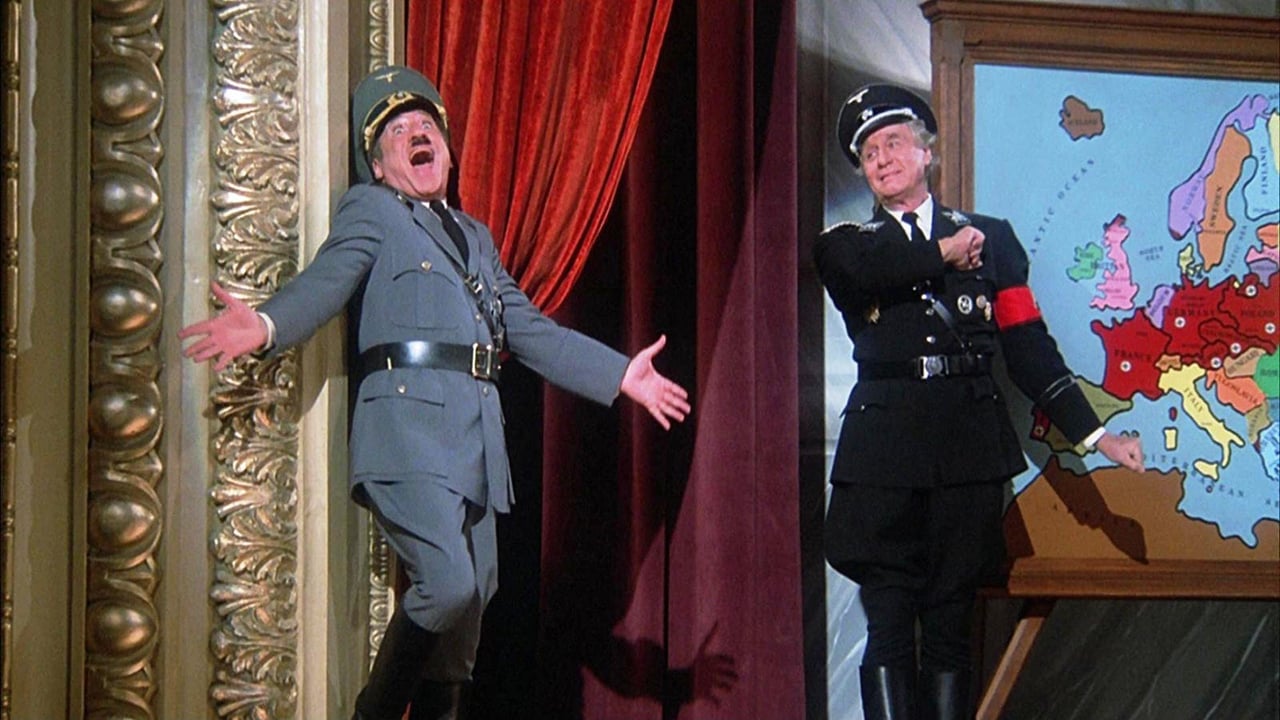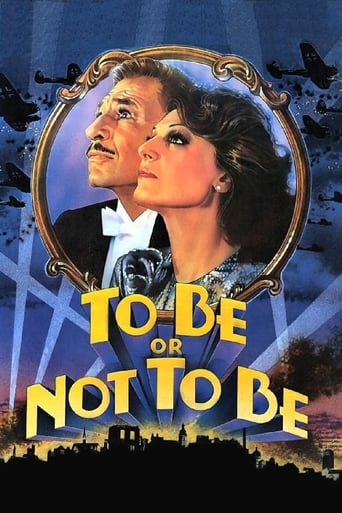

You won't be disappointed!
... View MoreAm I Missing Something?
... View MoreToo much about the plot just didn't add up, the writing was bad, some of the scenes were cringey and awkward,
... View MoreThe storyline feels a little thin and moth-eaten in parts but this sequel is plenty of fun.
... View MoreI'm pushing my way through a collection of Mel Brooks films. Along the way, I've revisited some classics, been introduced to others, and stumbled across the occasional odd title I've never even heard of before. One of those is TO BE OR NOT TO BE. From the title, I assumed it would be Brooks lampooning the works of William Shakespeare in the same fashion he's tackled Hitchcock, big budget sci-fi adventures, and westerns. I came to discover this wasn't a Mel Brooks movie in the traditional sense. For starters, he didn't write or direct it. It was directed by a man named Alan Johnson, whose film credits are primarily choreography and the only other film he directed was SOLARBABIES (a movie I'm only familiar with thanks to an episode of the "How Did This Get Made" podcast). TO BE OR NOT TO BE is a remake of a film of the same name from 1942; it tells the story of the world famous (in Poland, at least) theater duo Frederick and Anna Bronski, played by Mel Brooks and his wife Anne Bancroft. Their marriage is a rocky one, with Anna skirting the idea of a possible affair with the smitten Lieutenant Sobinski (Tim Matheson), but there's hardly time for any of that to come to pass as Adolf Hitler and his Third Reich have begun their invasion of Poland. Fate intervenes and the Bronskis will find their acting skills put to the ultimate test as they accidentally become involved in the Polish underground resistance.TO BE OR NOT TO BE is a strange little anomaly in my experience with Brooks' films because this one plays out as a normal narrative. His spoof films are different in that the jokes always come first and the plot only really exists on which to hang the gags. Make no mistake though; this is still very much a Brooks' film. The comedic styling of the film is very much in line with what you would expect from the man. Seeing as how director Johnson made a living as a choreographer, I wouldn't be surprised to find that Brooks was a helping hand behind the scenes in crafting the film. The film is also interesting in that it gives Brooks a chance to dive into a more serious subject than we're accustomed to seeing from him: World War II. Or, more specifically, the Third Reich and the subjugation of the Jewish people at the hands of the Nazis. TO BE OR NOT TO BE is a comedy but it's got its serious moments, even if it manages to try and inject a little fun in them to keep the movie from becoming too heavy. One prime example is a scene in the film when the Nazis arrive at the Bronskis' theater to arrest their homosexual friend, Sascha (James Haake). It's a frightening moment (because we as an audience understand what his arrest would mean for him) that's made a little easier to swallow because it plays comedically during a music number on stage where Sascha tries to hide amongst the showgirls in the routine.Brooks and Johnson manage to balance the humor and weight of the situation pretty well. It never really lets it get too heavy. They don't need to hit us upside the head with the real world horrors because we know all that; this is the tale of some nobodies (in the grand scheme of the war) and how they pulled the wool over the eyes of the foolish, bumbling Nazis. For a film with Holocaust themes looming, TO BE OR NOT TO BE is a lot of fun. The jokes are pretty consistent and the movie is loaded with a fantastic supporting cast including Christopher Lloyd in a small role as a beleaguered Nazi captain, Charles During as the Nazi S.S. colonel in charge, and the Bronski theater troupe including the talents of George Gaynes, George Wyner, and Jack Riley. All of this is topped off with the natural chemistry between stars Mel Brooks and Anne Bancroft, real life husband and wife, in the starring roles. For being one of Brooks' lesser-known films (I mean, I assume I know I hadn't heard of it before), TO BE OR NOT TO BE is one of his more solid. Let me put it this way: I was watching this and my nine-year-old daughter, who could only enjoy it at face-value with the jokes because she doesn't know anything about the war context at this point, couldn't take her eyes off the screen. This and SPACEBALLS are the two Mel Brooks movies we can enjoy together (she couldn't be bothered with MEN IN TIGHTS or YOUNG FRANKENSTEIN, and she's too young for BLAZING SADDLES or HISTORY OF THE WORLD).So, if you haven't seen TO BE OR NOT TO BE, I invite you to check it out. It's a hidden gem in his filmography that doesn't get much attention, and you generally can't go wrong with Brooks in the starring role. It may not rank up there with his greatest hits but it's a respectable, fun movie.
... View MoreFor anyone who hasn't seen the 1942 original film by this title, and especially for younger audiences today, this 1983 remake of "To Be or Not to Be" may be entertaining. Some may find it quite good. But for those who have seen the earlier film, the two films beg comparison. And when so viewed, this 1983 film can't hold a candle to the 1942 original. Mel Brooks made some funny and very good movies in his day. The best were those in which he satirized the movie industry or society in some way. But, in this film he doesn't satirize the original film. Instead, he plays it straight for the comedy that made the 1942 film. Jack Benny and Carol Lombard starred in the original, which was held up for release until after the U.S. entered the war. But that film was spot-on in its timing and its grilling of Nazi Germany over its invasion of Poland. It was a clear and excellent satire of the time. So, even seeing it many years later, audiences can still connect with it and relish the satire. On the other hand, what satire is there in a film made more than 40 years later? By then, the lampooning of the Nazis was an old and tiring act. Even done as a straight remake – as one might see a different cast in a Shakespeare play, this newer film is just flat. When it loses the reality and imminence of the threat that the first film portrayed, it also loses the punch and humor of satire. And, if one sets aside the satire – which is the essence of the story, at least in the initial film – this 1983 version still falls way short of the 1942 movie. I don't fault Brooks and Anne Bancroft for wanting to do a remake of such a fine film. But Brooks' portrayal of the main male character, Frederick Bronski, seems robotic compared to Jack Benny's Joseph Tura. In places, Brooks seemed to force his hammy acting, whereas Benny's was natural and hilarious. Nor was the rest of the cast in this second production up to the performances of all the supporting players in the 1942 film. In short, this film lacks the energy in the players, and the humor just doesn't come across as spontaneous and natural. One has a sense that this was one large staged remake, and that it became weighed down by the staginess of it. Still, it isn't a total dud. Some of the lines and scenes are funny. They would be, no matter who played them. For those who have enjoyed this film, I recommend getting hold of the original to watch it. It's a wonderful WW II satire made and released early in that war. And the humor is that much funnier, and the satire that much more biting.
... View MoreActually, when interviewed about this movie, Mel Brooks said it was an homage to Jack Benny. And if you look, the Bronskis live on Kubelsky Street, Benny Kubelsky is Jack Benny's real name. There are many other touches that also show Brooks' love for the original. Anne Bancroft is a true treat. Her comedic talents shine, she was truly a rare actress, and will be missed.It was well done, with Mel Brooksian flair, and respectful of the original. I won't add comments about the acting, there are so many pros and cons at this point, one more won't make a difference. But if you have some free time, see BOTH of the movies. It's not sacrilege to like them both.
... View MoreWhen I saw this I had no idea it was a remake. I didn't know the original had been rated the 49th best comedy of all time by the AFI or that Brooks neither wrote nor directed it.What I knew was that from the moment it started to the moment the curtains came down I was laughing nonstop in awe of an incredible plot. The film managed to escalate with each passing scene. Just when you thought nothing more could be done to it, they managed to push it further and further. Brook's performance was dead on, as was the entire casts. It's the sort of movie that gives Christopher Loyd only seven or eight lines, and you love him for it and need to ask for anything more.It continually makes fun itself, building on jokes you thought were over half a movie ago. I'd place this movie above Spaceballs and below Men in Tights, but would say that it is without a doubt the best plot of any movie I've seen in some time, comedy or otherwise.This is a movie that you should waste no time seeking out and renting, buying, seeing in whatever way you can.Still not sold? I'll retell one of the jokes. Don't read further if you want the first five minutes to be as fresh as they were for me - if you're debating whether to see it or not, I hope this is able to sway you.They're in a theater, putting on a show. We hear the Polish songs - not quite sure what they're singing about. The curtain comes down on the two actors smiling and bowing together as the audience claps. The moment the audience can no longer see them the actors start bickering in Polish. We're not sure what they're discussing, but it's clearly a heated debate. The curtain then comes up, they immediately are smiling, bowing, curtain comes down once again and it's back to the Polish bickering. They continue bickering, stopping for an announcement over the loudspeakers in this vaudeville theater. "Attention, for the Sanity and Clarity of the Audience the rest of this movie will be English"Then the movie switches into English, and the plot begins.
... View More